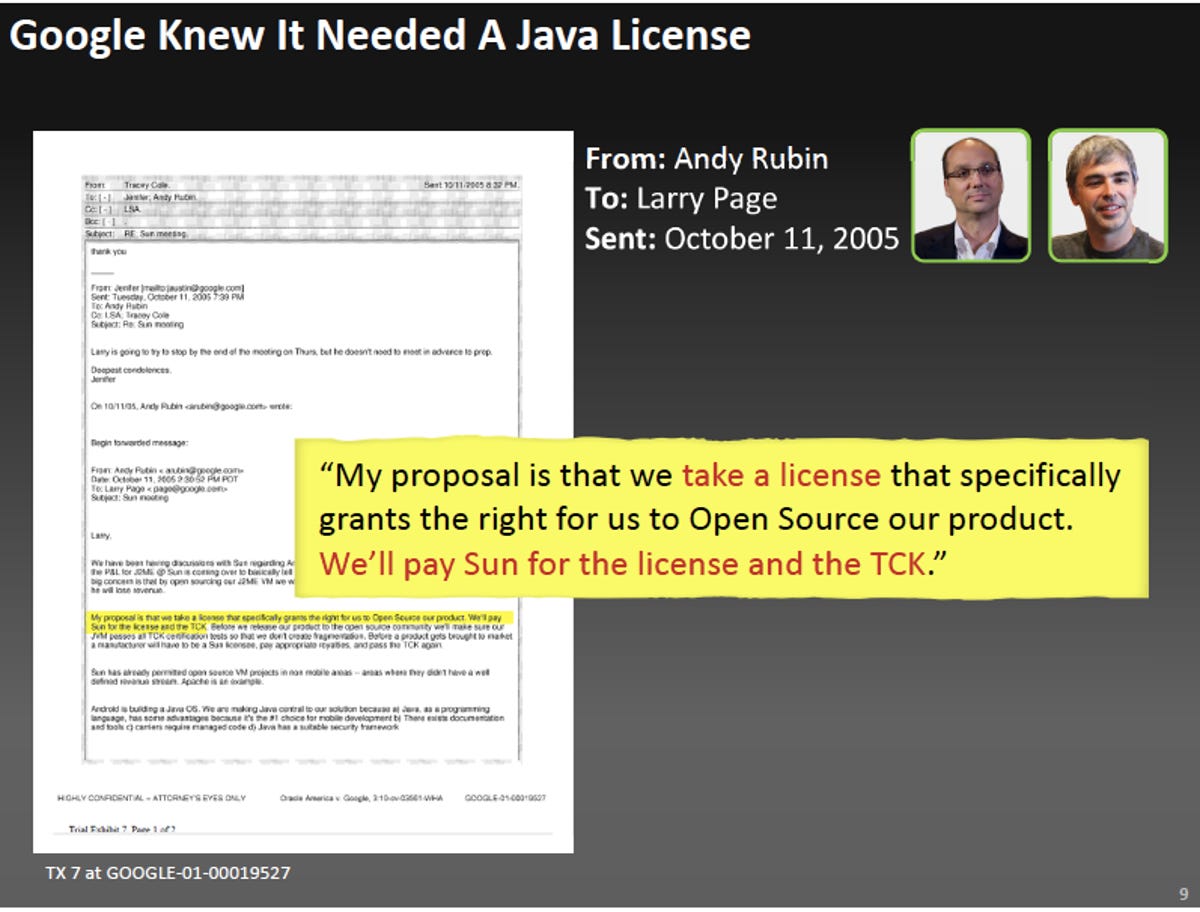SAN FRANCISCO — After a brief encounter yesterday afternoon here at the U.S. District Court in San Francisco, Oracle’s lead attorney David Boies continued his carefully crafted interrogation of Google’s Android chief Andy Rubin.
Boies placed about 40 documents in evidence to lay an intricate trail that he hopes will give the jury the impression that Rubin and Google knew that the company needed to license Java intellectual property.
To recap Monday’s testimony, Boies walked Rubin through e-mails and documents from 2005 and 2006 to establish that early on in Android development, Google acknowledged the need for a partnership with Sun or a TCK (Technical Compatibility Kit) license, and the unlikeliness of Google doing a cleanroom version of the Java Virtual Machine (JVM).
On October 11, 2005, Rubin wrote Google co-founder Larry Page about the need to take a license from Sun:
“My proposal is that we take a license that specifically grants the right for us to open source our product. We’ll pay Sun for the license and the TCK. Before we release our product to the open-source community, we’ll make sure our JVM passes all TCK certification tests so that we don’t create fragmentation.”
In 2006, Rubin wrote that the java.lang APIs were subject to copyright, which is the opposite of what Google is claiming now in its lawsuit with Oracle. “This copyright claim is a little crazy…that’s a lawyer-made-up thing,” Google’s lead lawyer Robert Van Nest said last week. Google also maintains that Android’s 15 million lines of code don’t infringe on any Oracle intellectual property. Oracle is asking for $1 billion in damages from Google.
Related stories
- Oracle and Google continue sparring over APIs
- Android chief Andy Rubin said java.lang APIs are copyrighted in 2006 e-mail
- Full coverage: Oracle v. Google
- Android, Java, and the tech behind Oracle v. Google (FAQ)
- Google’s Tim Lindholm faces off with David Boies on Java license
Boies today picked up where he left off, with Rubin examining a series of e-mail documents sent to or written by Rubin.
Boies focused on a e-mails from July 2006 in which Rubin said that a cleanroom implementation of the Java Virtual Machine was unlikely, given people from Sun working at Google are tainted, “and that would be bad.”
He also pointed to concerns expressed by Rubin in e-mails about “fragmentation,” or creating incompatibility with the Java specification. “If we don’t show strong efforts toward avoiding fragmentation, we are also going to have more trouble with Sun,” Tim Lindholm, former Sun Distinguished Engineer and Java guru who was assisting on the Android platform, wrote to Rubin.
“Sir, you knew in October 2005 that Sun wanted to avoid fragmentation,” Boies said.
Rubin said he was unclear whether Lindholm and Sun shared the same definition of fragmentation.
“But you know fragmentation had a definition used over and over. Right sir?” Boies responded.
After probing by Judge William Alsup regarding what he thought fragmentation meant, Rubin said, “There was some caution on my side in using the word ‘fragmentation’…My definition of fragmentation was incompatible implementations of Java.”
Rubin was not rattled by Boies’ machine gun questioning on the e-mails in which he appeared to be cautioning against fragmentation and advocating for a license from Sun. For several minutes Boies and Rubin debated the meaning of a “cc:” in an e-mail.


Oracle
A November 14, 2007 e-mail from the Google CEO Eric Schmidt to Rubin discussed certain statements Sun was making, referencing an e-mail from CNET reporter Stephen Shankland to Schmidt regarding to statements made to him by Rich Greene, head of software at Sun, expressing concern about Android fracturing the Java environment.
“Anything that creates a more diverse or fractured platform is not in (developers’) best interests,” said Green, speaking to reporters at the Oracle OpenWorld conference in San Francisco. “The feedback from developers is, ‘Help us fix this.'”
“We’re really interested in working with Google to make sure developers don’t end up with a fractured environment. We’re reaching out to Google and assuming they’ll be reaching out to us to ensure these platforms and APIs will be compatible so deployment on a wide variety of platforms will be possible,” Green said.
“I didn’t understand their definition of fractured,” Rubin said
“Did you ever ask anybody?” Boies asked.
“No,” Rubin said.
In the e-mail, Schmidt proposed helping solve the fragmentation issue. Rubin said he didn’t know what he meant by fragmentation.
Boies had no more questions.
Google will bring Rubin back to the stand later today or tomorrow when it begins to make its case in this API copyright phase of the trial. Boies will get another chance to go after Rubin.



